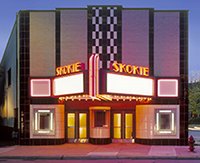
 Somewhat Recommended One of the elements of being a reviewer is the exposure that I get to a variety of theater companies and a great number of new works, some ready for the general theater public and others almost there, but not quite! MPAACT is a company that is dedicated to develop and nurture Afrikan Centered Theatre, in new works and collaborative art. Their current production, “The Last Saint on Sugar Hill”, now onstage at The Greenhouse Theater Center is an intense character study of a family ( of men) in Harlem. The family is composed of the father, Napoleon Pedigrew ( a powerful performance by Trinity Parnell) and his two sons. The elder son, Dexter ( deftly handled by Mateo Smith) wants to help people and give back to his community. His little brother “Z” ( David Goodloe) wants to enjoy the good life) The boys work for their father who is in reality a slum landlord, but has prospered over the years allowing his sons to have what others in the area could only dream of. Napolean has a strong hold on his sons who go out late at night to collect past due rents and rid their buildings of squatters. The area is changing and the African Americans are being forced out by gentrification and as the economy worsens so does their business.
Somewhat Recommended One of the elements of being a reviewer is the exposure that I get to a variety of theater companies and a great number of new works, some ready for the general theater public and others almost there, but not quite! MPAACT is a company that is dedicated to develop and nurture Afrikan Centered Theatre, in new works and collaborative art. Their current production, “The Last Saint on Sugar Hill”, now onstage at The Greenhouse Theater Center is an intense character study of a family ( of men) in Harlem. The family is composed of the father, Napoleon Pedigrew ( a powerful performance by Trinity Parnell) and his two sons. The elder son, Dexter ( deftly handled by Mateo Smith) wants to help people and give back to his community. His little brother “Z” ( David Goodloe) wants to enjoy the good life) The boys work for their father who is in reality a slum landlord, but has prospered over the years allowing his sons to have what others in the area could only dream of. Napolean has a strong hold on his sons who go out late at night to collect past due rents and rid their buildings of squatters. The area is changing and the African Americans are being forced out by gentrification and as the economy worsens so does their business.
“Z” would rather party-on with the new residents of the area, bar hopping and meeting a more affluent and better educated type of person. Dexter on the other hand was forced to leave school and his desire to be a doctor that would help the community and do his fathers dirty work. He has however , on the side, teamed up with an old classmate , Joseph ( Sati Word),who is now in residency, to open a storefront clinic to do what they can for the homeless. As it turns out, one of the holdings that the Pedigrew men own has a marvelous history and has been named as a historical landmark raising its value greatly- in fact, selling this building could put all three of these men on easy street. As it turns out, an old friend ( they refer t him as uncle) has been squatting in this building for ten years and clams that since he has been paying the taxes, it is his building, not Napolean’s, causing great pressure on this family business and its future.
Meanwhile, Joseph has nominated Dexter for a fellowship award for his work in the community, and as the story progresses, he gets closer to the award and then his family would know what he has been doing on the side. There is another character, a homeless man ( Terry Francois) who is slightly confusing and somewhat distracting in the beginning of this 90 minute story. I think playwright Keith Josef Adkins wanted this character to be slightly invisible to all, except Dexter, who has conversations with him on a regular basis. This character is always going through the trash looking for something and eventually finds an old newspaper that has a story about an incident many years ago in Cincinnati, ( where Dexter was born and raised until their sudden move to New York). I don’t want to confuse you but here is where I have to be careful as I do not want to give away some of the mystery of the events that brought this family out of Ohio and to Harlem where Napolean could build a better life for his sons and of course for him. The homeless man is a symbol of the past and allows us to see just why Dexter is who he is, but it is somewhat hard to determine this until almost halfway into the story. What he brings to the table opens up Dexter’s eyes to the reality of events that have caused him to think the way he does.
The “studio” theater at the Greenhouse is a small intimate space and while Danjuma Gaskin’s set design was somewhat limited by it, he is able to make some distinction between the real estate office and the storefront clinic as well as some of the street scenes near the property that is the cause of all the family friction. Casey Diers lighting is very effective and Andre Teamer has amassed a marvelous assortments o props adding some realism to the story. Director Carla Stillwell, Resident Director of the company tried very hard to capture the moods and work with this small stage, but there were several places where confusion took over. Early in the play, when Dexter left to go to his clinic, he left the office and came into the clinic through the door and always left the same way. In the final scenes of the play the men walk from the street into the office or from the office into the clinic leaving audience members to wonder if they had always been right next door to each other and if so, why didn’t brother and father know about the clinic? Often directors try to be stylistic and lose sight of how the audience will see the picture that is being painted. She missed the boat in a few places, but the overall picture and story is one that there are hidden secrets that come out and we see sons who come to a point of understanding their father and his choices and then choose to take their own paths. This is not “just a Black thing”, but a story about change in our lives and the quest to succeed no matter the price we pay, not always in money, but in our dignity.
This is a new play and has the start of something that could be a meaningful experience for young people. There is a lot of rough language and the use of the N word is certainly not needed as often as used except for Adkins wanting to show that despite his success, Napoleon is what he was and will always be. “Saint” will continue through June 12th at The Greenhouse Theater Center located at 2257 N. Lincoln Avenue with performances as follows:
Thursdays,Fridays and Saturdays at 8 p.m. and Sundays at 3 p.m.
Tickets are $15-$23 and can be purchased at the box office, by phone at 773-404-7336 or online at www.mpaact.org
This is general seating and is 90 minutes- no intermission.






More Stories
“Dummy in Diaspora”
“The Magic School Bus: Lost in the Solar System”
“February House” reviewed by Julia W. Rath